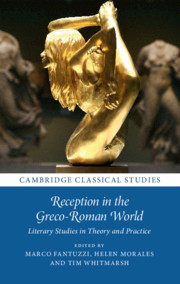Book contents
- Reception in the Greco-Roman World
- Cambridge Classical Studies
- Reception in the Greco-Roman World
- Copyright page
- Dedication
- Contents
- Figures
- Notes on Contributors
- Acknowledgements
- Abbreviations
- Altered States: Cultural Pluralism and Psychosis in Ancient Literary Receptions
- Part I Archaic and Classical Poetics
- Part II Classical Philosophy and Rhetoric, and Their Reception
- Part III Hellenistic and Roman Poetics
- Chapter 9 Before the Canon: The Reception of Greek Tragedy in Hellenistic Poetry
- Chapter 10 Pun-fried Concoctions: Wor(l)d-Blending in the Roman Kitchen
- Chapter 11 Powerful Presences: Horace’s Carmen Saeculare and Hellenistic Choral Traditions
- Part IV Multimedia and Intercultural Receptions in the Second Sophistic and Beyond
- References
- Index
Chapter 9 - Before the Canon: The Reception of Greek Tragedy in Hellenistic Poetry
from Part III - Hellenistic and Roman Poetics
Published online by Cambridge University Press: 05 June 2021
- Reception in the Greco-Roman World
- Cambridge Classical Studies
- Reception in the Greco-Roman World
- Copyright page
- Dedication
- Contents
- Figures
- Notes on Contributors
- Acknowledgements
- Abbreviations
- Altered States: Cultural Pluralism and Psychosis in Ancient Literary Receptions
- Part I Archaic and Classical Poetics
- Part II Classical Philosophy and Rhetoric, and Their Reception
- Part III Hellenistic and Roman Poetics
- Chapter 9 Before the Canon: The Reception of Greek Tragedy in Hellenistic Poetry
- Chapter 10 Pun-fried Concoctions: Wor(l)d-Blending in the Roman Kitchen
- Chapter 11 Powerful Presences: Horace’s Carmen Saeculare and Hellenistic Choral Traditions
- Part IV Multimedia and Intercultural Receptions in the Second Sophistic and Beyond
- References
- Index
Summary
In this chapter, the reception of Greek tragedy in Hellenistic poetry is studied in connection with intertextuality, which is here considered a specific form of reception by which later authors recognize the importance and relevance of earlier texts by alluding to them. There is a particular focus on the fragmentary plays of Aeschylus, Sophocles and Euripides. It shows that Callimachus, Apollonius and Theocritus used many Greek plays that are now lost. They referred to the plays’ plots or subjects, with an apparent preference for plays with Trojan, Argonautic and Argive myths, but also alluded to striking tragic imagery. Issues to which the allusions draw attention include literary criticism, generic matters, aspects of the mythological tradition and Ptolemaic ideology. All this suggests that the Alexandrian poets were familiar with the plays of Aeschylus, Sophocles and Euripides, particularly, but not exclusively those which were of thematic interest for their own poetry. Clearly the plays which were not included in the later canon of tragedies were still an object of active reception and consulted with eagerness in the Hellenistic period.
- Type
- Chapter
- Information
- Reception in the Greco-Roman WorldLiterary Studies in Theory and Practice, pp. 219 - 240Publisher: Cambridge University PressPrint publication year: 2021

